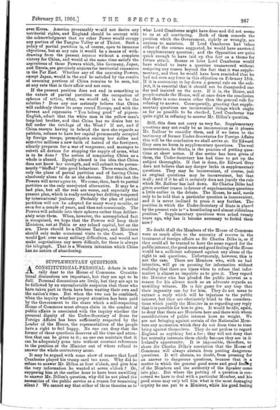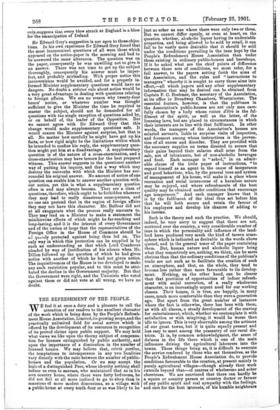. SUPPLEMENTARY QUESTIONS.
A.CONSTITCTIONAL-PERSONAL debate is natu- rally dear to the House of Commons. Constitu- tional discussions are important, but they are apt to be TeriOnal discussions are lively, but they are apt to be followed by aü uncomfortable suspicion that those who have, taken part in theta have been Wasting their own and the nation'e . But when the two can be .combined, *hen the inquiry whether proper attention has been paid by the Government to the share which a self-respecting House of 0031113101M must always claim in the conduct of puhlio affairs is associated with the inquiry whether the personal dignity of the Under-Secretary of State for Foreign Affairs has been sufficiently respected by the Leader of the House, the representatives of the people have a right to feel happy. No one can deny that the former of these questions aeservea all the time and atten- tion that can be given to it ; no one can maintain that it Can be adequately gone into without constant references to the position of the Minister out of whose refusal to answer the whole controversy arose.
- It may be argued with some show of reason that Lord Cranborne played his trump card too soon. Why did he refuee to answer Mr. Dillon at four o'clock, and give him the very Information he wanted at seven o'clock ? Or, supposing him at the earlier hour to have been unwilling to answer Mr. Dillon's question, why did he not plead the necessities of .the public service as a reason for remaining Pilent ? We cannot say that either of these theories as to what Lord Cranborne might have done and did not seems to us at all convincing. Both of them concede the position which the Government, rightly or wrongly, are anxious to maintain. If Lord Cranborne had taken either of the courses suggested, he would have answered a supplementary question ; and the Opposition are quite quick enough to have laid up this fact as a theme for future attack. Sooner or later Lord Cranborne would have wished to leave a question unanswered •without assigning any reason beyond the fact that it was supple- mentary, and then he would have been reminded that he had not seen any force in this objection on February 18th. If it is convenient to lay down a general rule on the sub- ject, it is essential that it should not be disregarded mie day and insisted on the next. If it is, the House, and people outside the House, will at once draw the conclueion that there is some reason other than the general rule for refusing to answer. Consequently, granting that supple- mentary questions are inconvenient things whiCh ought as far as possible to be checked, Lord Cranborne was quite right in refusing to answer Dlr. Dillon's question.
Still, this does not carry us very far. Supplementary questions may not really be as inconvenient as it pleases Mr. Balfour to consider them, and if we listen to the testimony of former Under-Secretaries for Foreign Affairs this will be the conclusion we shall arrive at: Sir Edward. Grey sees no harm in supplementary questions. The real inconvenience, he thinks, is the practice of ,putting ques- tions at short notice. If due notice has been given of them, the Under-Secretary has bad time to get up the subject thoroughly. If that is done Sir Edward. Grey does not believe that any danger lurks in supplementary questions. They may be inconvenient, of course, just as original questions may be inconvenient, but that is all ; and if it be all it certainly does not justify the rule which Mr. Balfour has laid down. Sir Charles Dilke had given another reason in favour of supplementary questions a little earlier in the debate. The House, he said, needs only to be told that a particular question is inconvenient, and it is never inclined to press it any further. The position in which the Under-Secretary of State is placed by the present rule is " a humiliating and almost ridiculous position." Supplementary questions were asked twenty years ago, why has it become necessary to forbid them now' No doubt if all the Members of the House-of Commons were as much alive to the necessity of reserve in the treatment of foreign affairs as Sir Charles Mike is, or if they could all be trusted to have the some regard for the public interest, the good sense and good feeling of the House would be a sufficient safeguard against any abuse of the right to ask questions. Unfortunately, however, this is not the case. There are Members who, with no bad intention, will go on pressing for information without realising that there are times when to refuse -that infor- mation is almost as impolitic as. to give it. They regard the Minister who has pleaded the public ,interest as a reason for his silence much as an advocate regards an unwilling witness. He is fair game for any trap that their ingenuity can lay for him. They do not mean to extract a reply which will be injurious to the public interest, but they are obstinately blind to the considera- tions which justify the Mini:;ter in so regarding any reply that it is possible for him to give. It would be idle, again, to deny that there are Members here and there with whom considerations of public interest have no weight. We are not bringing against certain of the Nationalist Mem- bers any accusation which they do not from time to time bring against themselves. They do not profess to regard England as anything but a foe ; they will not deny that her necessity interests them chiefly becluse they see in it Ireland's opportunity. It is impossible, therefore, to share Sir Charles Dilke's conviction that the House of COMMODS will always abstain from putting dangerous questions. It will abstain, no doubt, from pressing for an answer to dangerous questions, because that is a• matter in which the general good sense and good feeilag of the Members and the authority of the Speaker come into play. But where the putting of a question is con- cerned we have to deal with a particular Member, and his good sense may only tell him what is the most damaging inquiry he can put to a Minister, while his good feeling only,suggests that every blow struck at England is a blow for the emancipation of Ireland Sir Edward Grey's suggestion is not open to these objec- tions. In his own experience Sir Edward Grey found that the most inconvenient questions of all were those which appeared on the notice-paper in the morning and had to be answered the same afternoon. The question was on the paper, consequently he was unwilling not to give it an answer. There was not time to get up the subject thoroughly, consequently his answer must be imper- fect, and probably misleading. With proper notice this inconvenience would be avoided, and for a properly in- formed Minister supplementary questions would have no dangers. No doubt a stricter rule about notice would be a very great advantage in dealing with questions relating to foreign affairs. We see no reason why twenty-four hours' notice, or whatever number was thought sufficient to give the Minister the time be required to master the subject, should not be demanded for all questions with the single exception of questions asked by, or on behalf of, the leader of the Opposition. But we cannot agree with Sir Edward Grey that this change would make supplementary questions safe. It would ensure the Minister against surprise, but that is all. No matter how carefully he might have got up his facts, or how rigid might be the limitations within which he intended to confine his reply, the supplementary ques- tion might put him at a disadvantage. A supplementary question is of the nature of a cross-examination, and a cross-examination may have terrors for the best prepared witness. This answer suggests to the questioner another way of putting his inquiry, and that a way which may destroy the outworks with which the Minister has sur- rounded his original answer. No amount of notice of one question can enable him to answer another question with- out notice, yet this is what a supplementary question often is and may always become. They are a class of questions, therefore, which ought to be forbidden wherever they may lead to really disastrous consequences, and no one can pretend that in the region of foreign affairs they may not have this character. Mr. Balfour did not at all exaggerate what the process really amounts to. They may lead on a Minister to make a statement the mischievous effects of which might be far-reaching and long-lasting, and it is the interest of every Government and of the nation at large that the representatives of the Foreign Office in the House of Commons should be ac; qu.Lely protected against being thus led on. The only way in which this protection can be supplied is by such an understanding as that which Lord Cranborne pleaded by way of justification of his silence when Mr. Dillon followed up the question of which he had given notice with another of which he had not given notice. The inquisitiveness of the House is too developed to make any such restriction popular, and to this must be attri- buted the decline in the Government majority. But that the Government were right, and the Unionists who voted against them or did not vote at all wrong, we have no doubt.







































 Previous page
Previous page